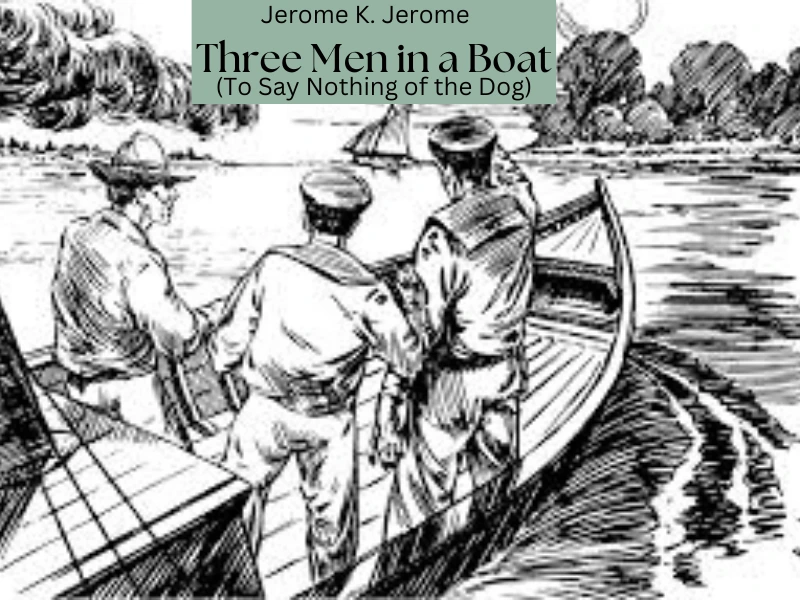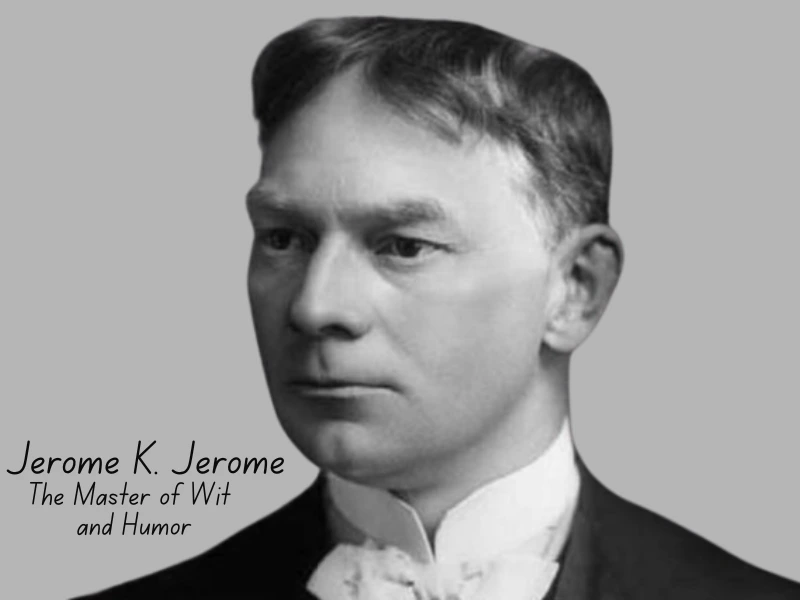Jerome K. Jerome: The Master of Wit and Humor
Jerome K. Jerome is regarded as one of the cherished humorists of England. Famous for his timelessness in Three Men in a Boat (To Say Nothing of the Dog), his wit and satire still fall upon cheerful ears after more than a century. Observant of life’s absurdities, he continues as one of the most important figures in literature and humor.
Personal Information
- Full Name: Jerome Klapka Jerome
- Date of Birth: May 2, 1859
- Place of Birth: Caldmore, Walsall, Staffordshire, England
- Parents:
- Father: Jerome Clapp (formerly Jerome Clapp Jerome), a preacher and ironmonger.
- Mother: Marguerite Jones.
- Marriage: Jerome married Georgina Elizabeth Henrietta Stanley (Ettie) in 1888.
- Famous Works:
- Jerome is best known for:
- Three Men in a Boat (To Say Nothing of the Dog)
- Idle Thoughts of an Idle Fellow
- Three Men on the Bummel
- Diary of a Pilgrimage
- Death: June 14, 1927, in Northampton, England, at the age of 68.
Early Life of Jerome K. Jerome
Birth and Family
Jerome Klapka Jerome was born on May 2, 1859, in Caldmore, Walsall, England. Jerome Clapp, the father, who preached and traded in ironmongery, faced serious financial struggles. The family of four had his mother, Marguerite Jones, for its manager.
Education and Early Struggles
Jerome’s education was modest because his family was not well off. After his father’s death, the family sank into deeper poverty, and Jerome had to leave school at 14. He did a series of odd jobs, including being a railway clerk, schoolteacher, and actor. These experiences gave him unique insights into human nature, which later fueled his writing.
Journey into Writing
Early Career
Jerome started as a writer who wrote short essays and contributed for magazines. His initial book, which was On the Stage—and Off (1885), humorously narrated an account of acting. Though well-received rather modestly in its time, it marked him as a comedy writer.
Breakthrough with Three Men in a Boat
In 1889, Jerome wrote Three Men in a Boat (To Say Nothing of the Dog), the story of a boating trip up the River Thames told comically. The book was the popular success of the inspired idea of Jerome’s experiences of the holidays with his friends. Its humor, character, and vivid descriptions of mishaps appealed to readers the world over.
Fun Fact: The book has never been out of print since its publication.
Famous Books by Jerome K. Jerome
Jerome K. Jerome is renowned for his humorous and witty literary works that continue to entertain readers worldwide. Below is a list of his most notable books:
1. Three Men in a Boat (To Say Nothing of the Dog) (1889)
- Plot Summary:
The novel tells the misadventures of three friends—Jerome (J.), George, and Harris—and a dog named Montmorency, as they go on a boating trip along the River Thames. The book was originally intended as a travel guide but humorously describes their attempts to escape the stresses of London life by reconnecting with nature. - The funniest part, however, involves packing mishaps and cooking disasters, as well as hilarious historical anecdotes about their landmarks. Still, their attempt to do well often turns awry because they are lazy and also inefficient, having a tendency to overcomplicate simple tasks.
Key Themes
- Humor in Everyday Life:
The book excels in finding comedy in totally ordinary situations, like misunderstandings, clumsy behavior, and exaggerated storytelling. - Friendship and Camaraderie:
The interactions between the three friends highlight the quirks and dynamics of close relationships, making their bond relatable to readers. - Satirical Commentary:
Jerome uses humor to poke fun at societal norms, human behavior, and the pretensions of the Victorian middle class. - The Beauty of Nature:
While comedic, the book also features poetic descriptions of the English countryside and the serenity of the Thames so that readers get a glimpse of what 19th-century England had been.
2. Idle Thoughts of an Idle Fellow (1886)
- Description: A collection of humorous essays reflecting on ordinary aspects of life, such as love, food, and vanity, showcasing Jerome’s keen observational skills and lighthearted wit.
- Overview: The book is a series of humorous and reflective essays, written from the perspective of an “idle fellow” who muses about various aspects of life. With topics ranging from love and vanity to weather and eating, Jerome’s lighthearted and conversational tone makes the essays engaging and timeless.
Key Essays and Themes
Here are some of the notable essays in the book:
- “On Being Idle”
- Jerome humorously defends the joys of idleness, arguing that laziness can be a virtue when paired with the art of reflection.
- “On Being in Love”
- A playful exploration of the irrationality and charm of love, filled with wit and candid observations.
- “On Being Hard Up”
- Jerome reflects on the struggles of being short on money, offering both humor and empathy for those in similar situations.
- “On Vanity and Vanities”
- A satirical take on human pride and our obsession with appearances.
- “On Eating and Drinking”
- A lighthearted essay that pokes fun at humanity’s endless love for food and indulgence.
- “On the Weather”
- Jerome finds humor in the British obsession with discussing the weather, presenting it as a national pastime.
- “On Cats and Dogs”
- A humorous comparison of the personalities and quirks of cats and dogs, showcasing Jerome’s love for animals.
3. Three Men on the Bummel (1900)
- Description:
A sequel to Three Men in a Boat, this book follows the same trio on a bicycle trip across Germany. It retains the humor and charm of its predecessor.
4. Diary of a Pilgrimage (1891)
- Description: A humorous travelogue documenting Jerome’s journey to Oberammergau in Germany to see the Passion Play. It is filled with witty observations and amusing mishaps.
- Plot Overview:
- The book is written in the form of a diary, chronicling the narrator’s travel experiences alongside his friend, referred to only as “B.” Their trip takes them through bustling train stations, scenic countryside, and lively towns in Germany, all leading up to their visit to Oberammergau.
- Jerome humorously describes the mishaps, cultural encounters, and peculiarities of travel during the late 19th century. While the Passion Play is the intended highlight, much of the book’s charm comes from the duo’s comedic adventures and Jerome’s sharp observations about people, travel, and life.
Key Themes
- Humor in Travel
- Jerome captures the unpredictability and absurdity of travel, from navigating train schedules to dealing with fellow travelers. His lighthearted approach makes even mundane moments entertaining.
- Cultural Satire
- The book playfully pokes fun at cultural differences between the British and Germans, often exaggerating for comedic effect while maintaining an affectionate tone.
- Philosophical Musings
- Beneath the humor, Jerome reflects on deeper topics like faith, tradition, and human behavior, making the book more than just a comedic travelogue.
5. Paul Kelver (1902)
- Description:
A semi-autobiographical novel that explores Jerome’s early life, struggles, and aspirations. It is one of his more serious works, blending humor with poignant storytelling.
6. The Second Thoughts of an Idle Fellow (1898)
- Description:
A follow-up to Idle Thoughts of an Idle Fellow, this collection of essays delves deeper into philosophical musings while maintaining Jerome’s signature humor.
7. Tommy and Co. (1904)
- Description:
A novel that humorously explores the lives of journalists and the media world, offering sharp social commentary alongside comedic elements.
8. They and I (1909)
- Description:
A humorous account of a middle-aged man’s experiences living in the countryside with his children, filled with amusing insights into family life.
9. The Passing of the Third Floor Back (1907)
- Description:
A thought-provoking play and novella that explores themes of kindness, compassion, and redemption, diverging from Jerome’s usual comedic style.
10. Barbara (1892)
- Description:
A comedy play co-written with Eden Phillpotts, showcasing Jerome’s talent for witty dialogue and lighthearted drama.
11. Stage-Land (1889)
- Description:
A humorous critique of theater conventions and stereotypes, poking fun at the tropes of stage productions.
Short Stories
Told After Supper (1891)
- Description:
A collection of ghost stories told with Jerome’s signature comedic twist. It humorously subverts the traditional ghost story genre.

Poetry by Jerome K. Jerome
While Jerome K. Jerome is essentially known for his humorous essays, novels, and plays, he also did some poetry that reveals his wit, philosophical reflections, and the eye with which he observes people. His lesser-known works in poetry nonetheless reflect his unique perspective regarding life and human nature. Some of the notable poems are given below:
1. “A Prayer”
- Theme:
This poem is a heartfelt plea to God, asking for strength, courage, and humility rather than material wealth or ease in life. - Excerpt:
“Teach me to do the best I can,
To help and cheer my fellow-man;
Teach me to lose my selfish needs,
And glory in heroic deeds.”
2. “A Dream of England”
- Theme:
A nostalgic reflection on England, capturing its landscapes, traditions, and culture. It conveys Jerome’s deep affection for his homeland. - Excerpt:
“I dream of England, and the night
Is fair with stars; I see the light
Gleam soft through cottage panes, and hear
The sound of footsteps drawing near.”
3. “On the Art of Making Up One’s Mind”
- Theme:
This humorous poem explores the indecisiveness of human nature, with witty commentary on life’s trivial and serious choices. - Excerpt:
“And when I’ve gone and done it, I go feeling no end gay,
And say: ‘Well now, I never thought I’d make up mind that way!’”
4. “The Passing of the Year”
- Theme:
A contemplative poem about the passage of time, reflecting on the year’s end and the inevitability of change. - Excerpt:
“The old year passeth, and the new year stands
Ready to clasp us with its outstretched hands;
New hopes, new dreams, new joys it brings to men,
But ah! To dream the old year back again.”
Themes in Jerome K. Jerome’s Poetry
- Humor and Wit:
True to his style, Jerome infused lightheartedness and humor into many of his poems. - Philosophy and Reflection:
His poetry often contains introspective and philosophical elements, offering a glimpse into his deeper thoughts. - Nature and Nostalgia:
Many poems celebrate the beauty of nature and Jerome’s longing for simpler times.
Autobiography
My Life and Times (1926)
- Description:
Jerome’s autobiography, offering insights into his personal life, career, and literary achievements. Written with humor and honesty, it is a valuable resource for understanding the man behind the humor.
Also read Shirley Toulson Biography
Literary Style and Themes
Jerome’s works are characterized by sharp wit, self-deprecation, and observations of everyday life. He could find comedy in the most ordinary situations, and his works thus became relatable to readers of all backgrounds.
Most of Jerome’s stories are centered on camaraderie and misadventures, reflecting the joys and challenges of human relationships. Beyond the humor, however, Jerome wove philosophical musings and social satire into his works, providing a deeper look at the absurdities of life.
Famous Quotes by Jerome K. Jerome
Jerome K. Jerome, known for his wit and humor, left behind many memorable quotes that reflect his keen observations of life, relationships, and human nature. Here are some of his most famous quotes:
On Life and Humor
- “It is always the best policy to speak the truth—unless, of course, you are an exceptionally good liar.”
- “I like work: it fascinates me. I can sit and look at it for hours.”
- “Time is but the shadow of the world upon the background of eternity.”
- “If you are foolish enough to be contented, don’t show it, but grumble with the rest.”
On Relationships and Human Nature
- “Love is like the measles; we all have to go through it.”
- “The weather is like the government—always in the wrong.”
- “It is impossible to enjoy idling thoroughly unless one has plenty of work to do.”
- “What I am looking for is a blessing not in disguise.”
On Travel and Adventure
- “The boat glided on, and I sat dreaming.”
(From Three Men in a Boat)- “We are so bound together that no man can labor for himself alone. Each blow he strikes in his own behalf helps to mold the universe.”
On Writing and Storytelling
- “Nothing is more irritating than not being invited to a party you wouldn’t be seen dead at.”
- “There is no fun in doing nothing when you have nothing to do.”
- “The great art of life is sensation, to feel that we exist, even in pain.”
On Idleness and Philosophy
- “It is so pleasant to come across people more stupid than ourselves. We love them at once for being so.”
- “Idleness, like kisses, to be sweet must be stolen.”
Personal Life
Marriage
Jerome married Georgina Elizabeth Henrietta Stanley, affectionately known as “Ettie,” in 1888. Ettie had a daughter from her previous marriage, whom Jerome adopted. Their marriage was a loving partnership, and Ettie often supported Jerome’s literary endeavors.
Later Years
He continued writing in his later years but never achieved the success of Three Men in a Boat. He was an ambulance driver during World War I, which was a very traumatic experience for him. Jerome died on June 14, 1927, in Northampton, England, at the age of 68, leaving behind a legacy of laughter and timeless humor.
Legacy of Jerome K. Jerome
Impact on Humor Literature
Jerome’s ability to blend wit, satire, and relatable storytelling made him a pioneer of modern humor writing. His works continue to inspire writers and entertain readers worldwide.
Cultural References
- Three Men in a Boat has been adapted into plays, films, and TV shows, cementing its place in popular culture.
- Jerome’s observational style has influenced humorists like P.G. Wodehouse and Douglas Adams.
Conclusion
Jerome K. Jerome’s life and works remind us of the power of humor to brighten even the darkest times. From his humble beginnings to becoming one of England’s most beloved authors, his legacy endures in the laughter and joy his stories continue to bring to readers around the globe.
FAQs
Is Three Men in a Boat a real story?
Three Men in a Boat is partially based on real-life events. Jerome K. Jerome drew inspiration from a boating trip he took on the River Thames with his friends, George Wingrave and Carl Hentschel, but the comedic anecdotes and exaggerated mishaps were fictionalized for humor.
What was Jerome K. Jerome’s famous quote?
One of Jerome K. Jerome’s most famous quotes is:
“It is always the best policy to speak the truth—unless, of course, you are an exceptionally good liar.”
What does Jerome K. Jerome say about affection?
In Three Men in a Boat, Jerome reflects on the nature of dogs and affection, writing:
“They never talk about themselves but listen to you while you talk about yourself, and keep up an appearance of being interested in the conversation.”
This highlights his view of affection as selfless and sincere, as often exemplified by pets like Montmorency, the dog in the novel.
What is the character sketch of Jerome (J.) in Three Men in a Boat?
Jerome (referred to as “J.”) is the narrator of the story and a semi-autobiographical character.
Personality: Witty, sarcastic, and self-deprecating, J. often finds humor in everyday situations.
Observational Skills: He has a sharp eye for human behavior, often poking fun at himself and others.
Philosophical Side: Amid the humor, J. occasionally reflects on deeper themes like nature’s beauty and life’s simplicity.
Relatable Flaws: J. is prone to laziness, overthinking, and exaggerated storytelling, making him an endearing and relatable character.




Have you ever considered about adding a little bit
more than just your articles? I mean, what you
say is fundamental and everything. But just imagine if you added some great images or video clips to give your posts more, “pop”!
Your content is excellent but with images and videos, this site could undeniably be one of the best in its
niche. Superb blog!
Very good write-up. I absolutely appreciate this site.
Keep it up!
What i do not understood is if truth be told how you’re not really a lot more well-appreciated than you might be right now. You are so intelligent. You already know thus considerably in the case of this subject, made me for my part believe it from a lot of numerous angles. Its like men and women aren’t involved unless it?¦s something to do with Woman gaga! Your personal stuffs excellent. All the time maintain it up!
I¦ve been exploring for a little bit for any high quality articles or blog posts on this kind of space . Exploring in Yahoo I eventually stumbled upon this web site. Reading this information So i¦m glad to express that I’ve an incredibly just right uncanny feeling I came upon exactly what I needed. I so much indubitably will make certain to do not overlook this web site and provides it a look regularly.
As a Newbie, I am continuously exploring online for articles that can aid me. Thank you